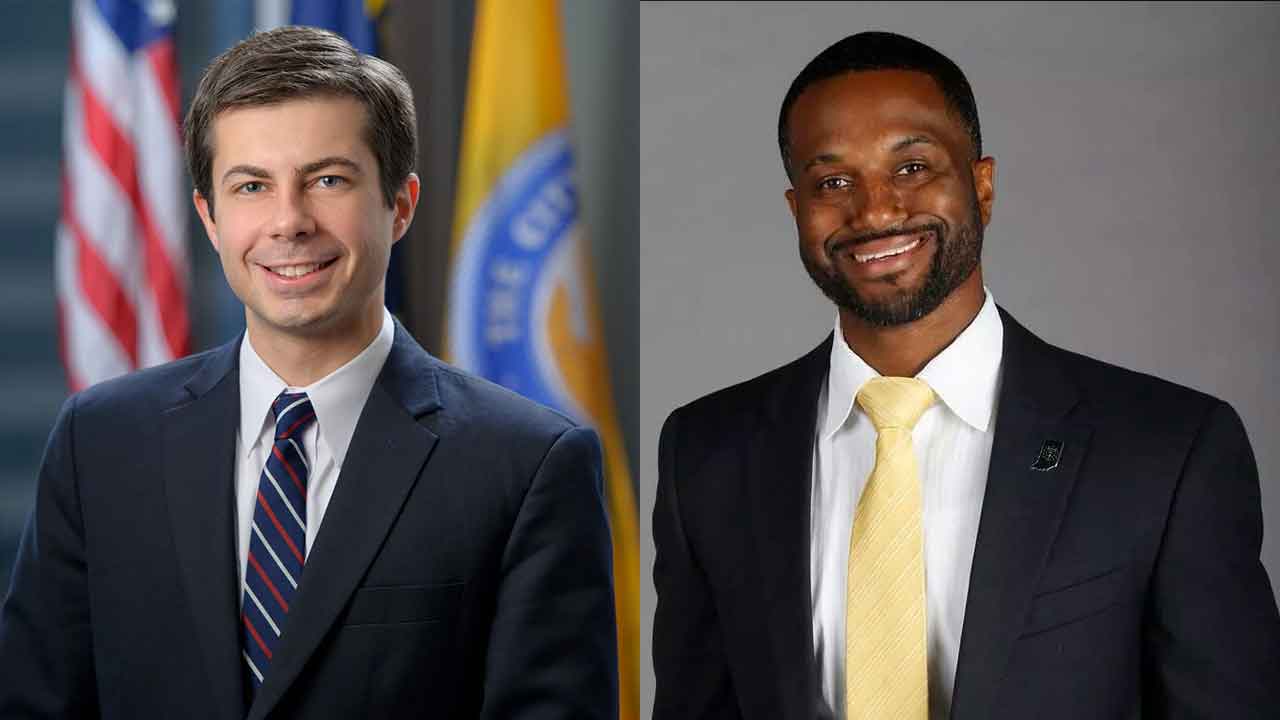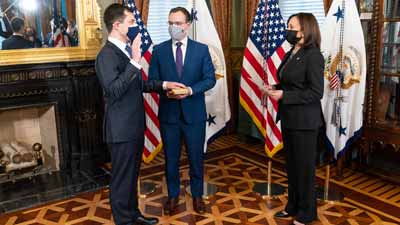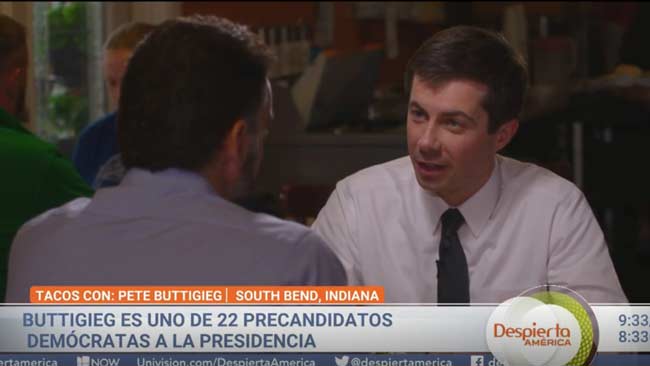The South Bend Voice is publishing a series of articles on local candidates running for city offices. We believe that it is vitally important for voters to be informed before they head to the ballot box on May 5. While we do not endorse individual candidates, we are providing an equal opportunity for candidates to share their views with the public.
Both candidates for South Bend mayor have responded to a questionnaire that we sent last week asking them questions pertinent to the position. Only light alterations have been made for spelling and grammar. We believe that our job is to ask the tough questions and the candidates’ responsibility is to speak directly to voters.
We have limited responses to 250 words or less. We should also note that candidates did not have the opportunity to see their opponent’s responses ahead of time.
With that said, let’s introduce the two mayoral candidates.
Quick Facts
Full Name: Pete Buttigieg
Current Job Title: Mayor
College Major: History and Literature
University Alma Mater: Harvard University, University of Oxford
Experience in Elected Office: Mayor of South Bend (2011-Present)
Full Name: Henry Davis, Jr.
Current Job Title: City Councilman, 2nd District
College Major: B.A., Art
University Alma Mater: Earlham College
Experience in Elected Office: Precinct Committee Chairman (2005-present), State Delegate (Appointed 2006 and Elected 2014), Common Councilmember (2008-present), Young Elected Official State Director (2009-2014)
Candidate Questionnaire (responses in rotating order)
The economy and jobs remain a top priority of voters. South Bend — like the nation as a whole — has seen its unemployment rate fall considerably from the height of the recession but it remains above 6 percent, according to the Bureau of Labor Statistics. What would you do as mayor to bring high quality jobs to South Bend?
Buttigieg: Unemployment is down dramatically in South Bend since I took office. While we’ve made progress on this issue, there is still a lot of work to do. We need to continue to grow and retain existing local businesses, as well as attracting even more companies to locate in South Bend. As a city, one of the most important things we can do is to take care of the fundamentals — infrastructure, safety, neighborhoods, quality of life — so that businesses and the people who compose them want to come here and stay here.
We also will continue to simplify processes for dealing with the administration, along the lines of our recent change of the tax abatement paperwork into a more user-friendly format. And we must work proactively to address workforce readiness issues, building on early successes like the SMART program. We can do more to simplify the sequence of working through all of the zoning and planning requirements that confront many local businesses.
Davis: We must work to ensure that South Bend is an attractive city for new and growing businesses: stable, beautiful, and affordable for businesses and families. Through my “South Bend Future” initiative, I will work with all community stakeholders on a long-term Capital Improvement Plan focused on upgrading our infrastructure, planning strategically for growth, and making responsible financial decisions to make South Bend affordable for all families over the long-term.
I support the use of Project Labor Agreements and Community Benefit Agreements to ensure that with economic development comes greater equity and prosperity for all South Bend families. For example, Project Labor Agreements and Community Benefit Agreements can include provisions to hire locally, to work with local contractors, and to pay a living wage.
I believe that businesses and job creation thrive when community members have money to spend. To that end, I support a range of policies that put more money in the pockets of South Bend families: raising the minimum wage, keeping utility and property tax rates affordable, and protecting the fixed incomes of the elderly retirees who are the backbone of our community.
And lastly, as mayor I will work tirelessly to ensure that we are raising a generation of young people who are educated, prepared for the 21st-century workforce, and committed to raising their families and starting their businesses in the great city of South Bend.
A number of economic development projects have been announced in recent years, particularly around downtown. At the same time, the city has seen its tallest building fall into disrepair with nearly all tenants now relocated from the Chase Tower. Other redevelopment projects have simply not come to fruition. Do you believe that the city is making progress in restoring downtown and surrounding neighborhoods? What will you do to encourage development downtown and in South Bend’s neighborhoods, beyond what is already being done through existing initiatives?
Davis: The state of Chase Tower is a disgrace. It is shameful that one of our most prominent landmarks is in such disrepair. I led the development of a $21M, public-private partnership with several developers that would have revitalized Chase Tower at minimal cost to the South Bend taxpayer. In yet another example of his failed and reckless leadership, the sitting mayor axed that deal and has subsequently failed to find another developer to take on the project. We deserve better.
The example of Chase Tower is further evidence of the mounting structural obstacles we face in growing our city. Fundamentally, to spur economic development in South Bend, we must broaden the tax base. We must make our city an affordable and attractive location for businesses and families alike.
First, we must immediately resolve the discrepancy between the property values assessed by the county and the actual market rate of South Bend’s commercial and residential properties. For too long, politicians have banked on the property tax revenue generated by inflated property values. This sloppy accounting is bad for families, bad for businesses, and bad for South Bend. As mayor, I would work with county officials to bring these assessments in line with market values, as well as working with all stakeholders to develop a municipal budget that reflects both the short-term revenue decrease and the long-term growth of our tax base under more favorable and affordable conditions.
Buttigieg: One of the most remarkable things to happen to South Bend in this decade is the comeback of our downtown. Since I took office, downtown bars and restaurants have doubled, retail occupancy is at the highest level since the city started keeping track, and residential growth has taken place at a level not seen since the 1960s. Several significant projects happening over the coming months will continue this momentum. The successful completion of the Smart Streets initiative will be a huge boost to downtown. Cities that have undertaken similar initiatives have seen a reduction in crime, increased property values, and more investment along those streets.
Increasing the number of residents downtown will also be a priority over the next four years. As more people choose downtown living, that will lead to additional revenue for businesses downtown. Projects like the Lasalle Hotel and Hoffman Hotel are key to bringing more residents downtown.
The perception of safety remains critical to downtown’s success, and this is not just a matter of law enforcement. DTSB’s Ambassador Program adds to the sense of safety, and increased foot traffic will be the most important factor of all in making people feel safe downtown.
The “1,000 Houses in 1,000 Days” initiative to address vacant and abandoned housing through rehabilitation or demolition has been one of the main priorities of the Buttigieg administration. How would you characterize its success so far? What would you do differently if given the chance?
Buttigieg: The program has been very successful. To date, we’ve been able to address 804 vacant properties and counting. One of the things that most heartens me about this initiative is the number of homes that we’ve been able to restore rather than tear down. When I first ran for mayor, one of the most common issues that I heard when I went door to door was the number of vacant homes in our neighborhoods. These properties are often owned by out-of-town, or even out-of-state investors who have neglected to maintain the homes. Our neighborhoods are getting stronger because we have heard neighbors’ demands to do something about these properties.
Davis: Unfortunately, the “1,000 Houses in 1,000 Days” initiative is yet another example of the current administration’s knack for poor planning and punchy headlines. The mayor’s haphazard demolition strategy failed to account for state construction statutes; as a result, the majority of these lots cannot be redeveloped or rebuilt. Now, instead of streets pocked with abandoned buildings, we have streets pocked with vacant lots.
We deserve better than development by wrecking ball and government by press release. When it comes to addressing South Bend’s vacant and abandoned properties, my priority will continue to be securing, saving, and filling those homes. First, we must secure abandoned properties so that they do not become hubs for crime and violence. Other municipalities have successfully worked with the banks — which are ultimately responsible for the foreclosure crisis — to hold them accountable for securing and maintaining properties.
Secondly, I would focus on saving and restoring as many homes as possible through public-private partnerships with organizations like Habitat for Humanity. And lastly, we must work tirelessly to fill these homes with responsible local owners in the community, educating and encouraging prospective home buyers through civic workshops and making sure that South Bend is a stable and affordable city for all families.
Smart Streets has been another major initiative in recent years. The city is in the process of converting major downtown thoroughfares from one-way streets into two-way streets. The goal is to calm traffic and make the space more pedestrian-friendly, thereby making investment more attractive. City officials say that it will result in tens of millions of dollars in new investment, but it also requires millions of dollars to be allocated for capital funding. The Michigan Street and Main Street project approved by the Common Council in February will cost $25 million alone. Is this a wise use of taxpayer dollars?
Davis: Although I don’t disagree with the overall purpose of the Smart Streets Initiative, I have some profound questions about its execution. We have an engineering department. We have a streets department. Why are we burdening our children with over $40 million in debt to pay outside consultants to do the work of existing public departments?
The Smart Streets Initiative is not only an example of the sitting mayor’s poor fiscal planning but also an example of his misplaced priorities. He is willing to enter us into over $40 million of debt to reverse street directions, but he can’t find the money to upgrade playgrounds and basketball courts for our parks department. He can construct bike lanes downtown, but he can’t replace the historic elm trees planted by our senior citizens years ago.
We need to engage in comprehensive and strategic neighborhood development, not costly piecemeal projects with catchy names. For example, the Smart Streets Initiative was a missed opportunity to install more porous road materials that would cut down on the immense cost of the sewer overflow plan. As mayor, my “South Bend Future” initiative will engage all community stakeholders in an inclusive and transparent long-term planning process for our city that eliminates these oversights and keeps the tab as low as possible for South Bend’s working families.
Buttigieg: When we spend taxpayer dollars on infrastructure, we do so knowing that our community will see a return on that investment. While converting certain streets from one-way to two-way is part of the plan, it’s certainly not all of it. This effort is aimed at easing traffic flow, encouraging foot traffic which will increase the vitality of our storefronts, beautifying our streetscape, and increasing pedestrian safety. Downtown is not the only place benefiting from this plan. The Lincolnway and Western Avenue corridors are both going to receive substantial investment. Cities that make these investments have seen them pay off in a big way, and South Bend will be no exception.
The “Religious Freedom Restoration Act” drew negative national attention to Indiana with businesses threatening to pull out investments and social media calls for a boycott of the state. Do you believe that state lawmakers went far enough in their revision of the RFRA? What will you do as mayor to ensure that visitors have a positive impression of South Bend as an open and welcoming community?
Buttigieg: I believe that Indiana should add protections for LGBT Hoosiers to Indiana’s civil rights law, just like we did at the local level in 2012. I’m proud that South Bend has a Human Rights Ordinance protecting religious freedom as well as preventing discrimination against members of the LGBT community. I stood with members of South Bend’s business community to send the message that we are an open community, despite the steps taken by the governor and the state legislature on this issue.
South Bend has been a leader when it comes to creating an environment that is welcoming to all. As a state, we can’t afford to be seen as a state that is intolerant or unwelcoming. We need to be able to attract the absolute best and brightest.
Davis: The doors of the Henry Davis administration will be open to all community members as we pursue a safe and prosperous future for our city. I would work to restore our reputation for “Hoosier hospitality” by lifting up South Bend’s existing Human Rights Ordinance and by working with state legislators to revise RFRA to maximize inclusion and equity, not discrimination.
Police reform has become an issue of national importance in the wake of Ferguson and other incidents across the United States. What specific policy measures will you take to advance public safety and ensure accountability? Also, what will you do as mayor to improve relations between the police department and the community?
Davis: South Bend families deserve a leader who will put our safety first. Under the failed leadership of the current administration, the murder rate has doubled. Our police force has been divided and demoralized, and community trust in police is quickly eroding.
Yet instead of addressing these challenges head-on, the sitting mayor traffics in talking points and photo ops while sending an armored tank into our neighborhoods and overpaid outsiders in to take over for our top brass. We deserve better.
As mayor, I will make our safety a top priority for my administration with a focus on the proven, homegrown solutions our communities need:
1. Revitalize community policing. “Broken-windows” policing increases the likelihood of harassment while eroding the trust needed to tackle violent crime. We must prioritize youth programming, community meetings, and conflict de-escalation strategies.
2. Bring greater accountability and civilian review to the force. I will advance legislation for a Citizens Review Board to enhance community confidence and protect the integrity of investigations of alleged police misconduct.
3. Diversify the ranks of our force and police leadership. I will increase recruitment efforts to ensure that our police force reflects the gender, race, and language diversity of our community. To boost morale and build cohesion within the department, I will focus on promoting from within, ensuring that our force reflects the best talent our city has to offer from the bottom up.
Buttigieg: Cities like South Bend need to create environments of trust, especially between public safety professionals and the diverse communities they serve. We have started a program to promote hiring of excellent officers from diverse backgrounds so our police and other departments better reflect our city’s population. On the operational side, we have an accomplished and diverse Board of Public Safety that reviews disciplinary matters and promotions.
Meanwhile, we have launched a Group Violence Initiative to reduce incidents of gun violence, resulting in a drop in shootings of nearly 40% in just one year. We’re doubling down on community policing strategies, getting officers out of the vehicles and into the neighborhoods so real relationships of trust emerge between neighborhoods, including communities of color, and those sworn to keep them safe. Overall, the city administration will continue to keep the lines of communication open with every member of our community to ensure that our residents feel respected, heard and protected.
Polls show that voters have become disillusioned with institutions ranging from banks and the media to government. This is particularly true at the state and federal level. In addition, studies indicate that the national electorate is more polarized than at any point in recent history. What will you do as mayor to bring people of disparate backgrounds together to advance an agenda that unites our community?
Buttigieg: One of the things that is truly rewarding about serving at the local level is the ability to cut through partisan rhetoric to get things done for our residents and businesses. While federal and state governments may be mired in debate or inaction due to bickering, cities like South Bend can really focus on the issues that impact people in their daily lives. Our administration has created a city that is open to all. From our 311 help line to public safety to economic development to vacant housing, we have worked toward renewing every part of South Bend so we can celebrate a brighter future.
Davis: First and foremost, I believe that the path to unity begins with transparency and inclusion. As mayor, I will continue to fight for a City Hall that all South Bend families can trust. My “South Bend Future” initiative will bring together all community stakeholders for an honest conversation about the state of the city’s finances and how we can best grow our city in a comprehensive, strategic, and equitable manner. I am committed to opening South Bend’s books, reviewing all scheduled projects with a fine-toothed comb, and opening the doors of City Hall to all South Bend families — not just the wealthy and well-connected.
We must also remember that there is a vast network of extremely wealthy and powerful special interests that profit from partisan infighting and the distraction of the 24/7 news cycle. I’ve consistently fought back against a corrupt and unethical system, whether it was private developers who wanted to displace elderly community members or city politicians who count on sky-high property taxes and water bills to fund their pet projects. I’m proud of my track record of independent leadership on the city council, where for seven years I’ve fought to serve all people, regardless of race or income. As mayor, I’ll continue to stand up for working families like yours and mine.
Politics is often rough and tumble. Voters expect disagreement over policy but it can also devolve into nasty, personal attacks. Public introspection and praise of one’s opponent is rare. Keeping that in mind, what personal flaws are you willing to recognize? What would say is the best attribute of your opponent?
Davis: I have worked to promote democracy and inclusion by making myself as transparent and available as possible: on social media, in council meetings, in the community talking with voters, in the press and on the radio. I wanted my constituents to see me at work and in the process of making decisions that affect their lives and city. However, I recognize and regret the way in which that public record has made me an easy target for smear campaigns, and created a standard that I cannot always meet. Unfortunately, in this polarized political environment, there is a massive amount of pressure on public officials to toe the party line and stay on script, which only further shuts voters out of the democratic process.
Regarding my opponent, I will say that Mayor Buttigieg is a very skilled and articulate orator, although I very rarely agree with the substance of what he is saying!
Buttigieg: No one is perfect. All of us are constantly working to recognize the ways in which we could be better, stronger, more patient, so that we don’t make the same mistake twice. Time and experience have taught me the importance of listening to different perspectives and carefully communicating with all who have a stake in our work, especially those who might disagree.
As for my opponent, I would say that he is certainly passionate about the issues that are important to him. While we often disagree about many civic issues, I do listen to his concerns and respect his position on the Common Council.
We would like to thank the candidates for taking the time to share their views with voters. Be sure to vote on Tuesday, May 5.










